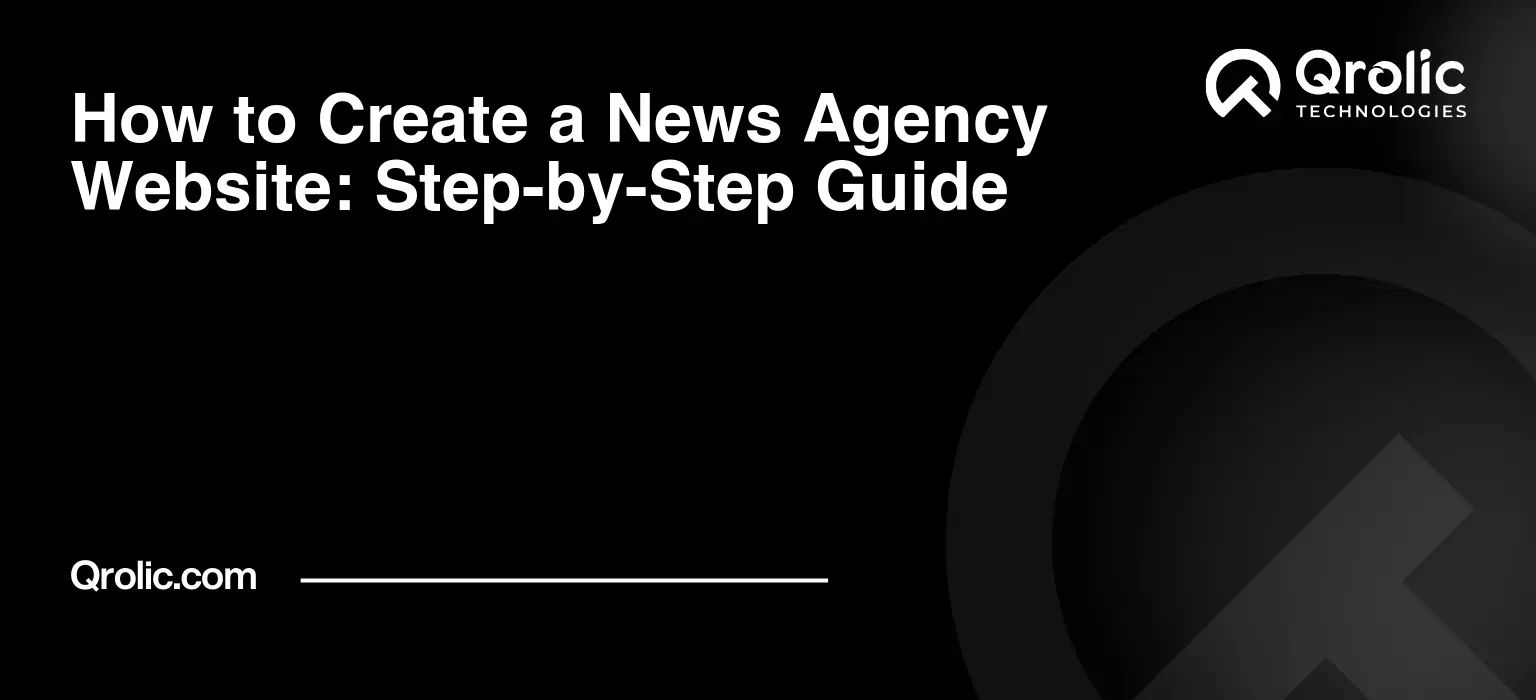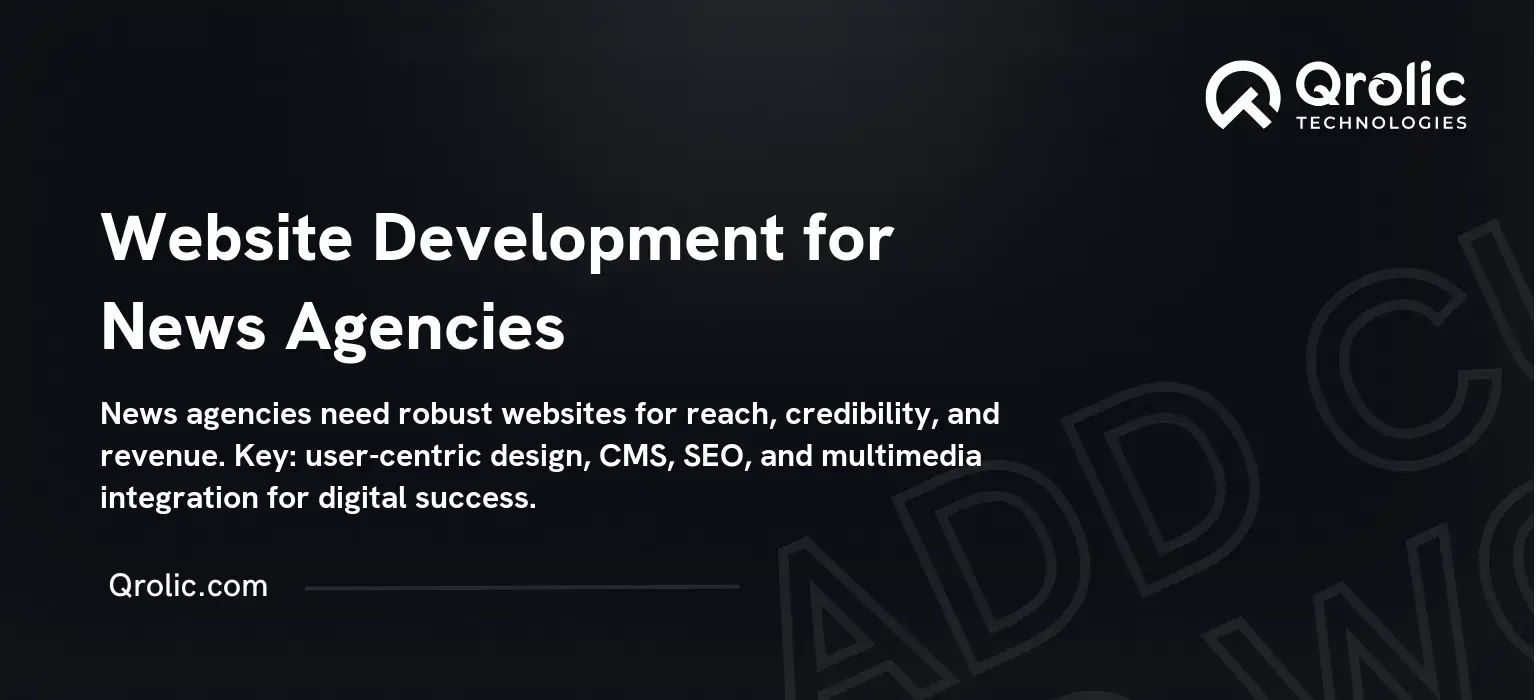Quick Summary:
- Plan your news agency website carefully.
- Build your site with CMS, theme, and plugins.
- Create great content, then promote and monetize.
- Measure success using website analytics.
Table of Contents
- 1. Laying the Foundation: Planning Your News Agency Website
- 1.1 Defining Your Niche and Target Audience
- 1.2 Choosing a Domain Name and Web Hosting
- 1.3 Developing a Content Strategy
- 2. Building Your News Agency Website: The Technical Setup
- 2.1 Choosing a Content Management System (CMS)
- 2.2 Selecting a News-Specific Theme or Template (“Journalism Design”)
- 2.3 Installing Essential Plugins
- 3. Populating Your News Agency Website: Content Creation and Management
- 3.1 Creating Engaging and Informative Content
- 3.2 Optimizing Content for Search Engines (SEO)
- 3.3 Managing and Organizing Content
- 4. Promoting Your News Agency Website: Reaching Your Audience
- 4.1 Social Media Marketing
- 4.2 Email Marketing
- 4.3 Public Relations and Media Outreach
- 5. Monetizing Your News Agency Website: Generating Revenue
- 5.1 Advertising
- 5.2 Subscriptions
- 5.3 Donations
- 6. Qrolic Technologies: Your Partner in Digital Success
- 7. Measuring Success: Analytics and Reporting
- 7.1 Setting Up Google Analytics
- 7.2 Creating Custom Reports
- 7.3 Using Data to Improve Your Website
1. Laying the Foundation: Planning Your News Agency Website
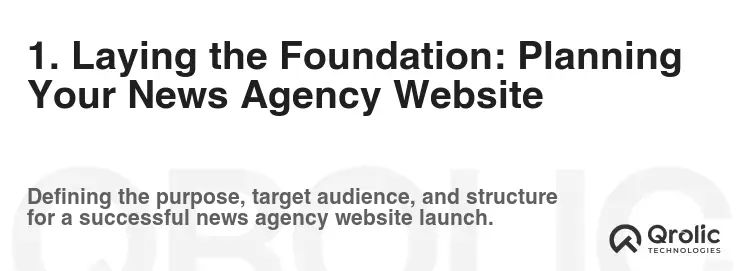
1.1 Defining Your Niche and Target Audience
Before diving into the technical aspects, you need a crystal-clear understanding of your news agency’s identity. Ask yourself: What kind of news will you cover? Who are you trying to reach? This foundational step will inform every decision, from domain name selection to content strategy.
1.1.1 Identifying Your Niche:
- Hyperlocal News: Focus on specific geographic areas, covering local events, politics, and community issues. This niche allows you to build a loyal following among residents who crave information about their immediate surroundings. Think city council meetings, school board decisions, and local business openings.
- Industry-Specific News: Cater to a particular industry, such as technology, finance, healthcare, or entertainment. This approach positions you as a go-to source for professionals seeking specialized information and insights.
- Political News: Delve into political reporting and analysis, focusing on national, regional, or international affairs. This niche requires a commitment to accuracy, objectivity, and in-depth investigation.
- Investigative Journalism: Dedicate your agency to uncovering hidden truths and exposing wrongdoing. This type of journalism demands significant resources and a relentless pursuit of facts.
- Data Journalism: Employ data analysis and visualization to tell compelling stories. This niche requires expertise in statistics, programming, and data interpretation.
- Solutions Journalism: Focus on reporting responses to social problems, highlighting effective solutions and promoting constructive dialogue.
1.1.2 Defining Your Target Audience:
- Demographics: Consider age, gender, location, education, and income level. Understanding your audience’s demographics will help you tailor your content and marketing efforts.
- Interests: What are your audience’s passions and hobbies? What topics resonate with them? Tailor your content to align with their interests and values.
- Information Consumption Habits: How do your audience members consume news? Do they prefer reading articles online, watching videos, listening to podcasts, or engaging on social media? Adapt your content formats to match their preferences.
- Pain Points: What challenges and problems does your audience face? How can your news coverage provide solutions or insights? Addressing their pain points will make your agency a valuable resource.
Example: A news agency targeting young professionals in the tech industry might focus on topics such as emerging technologies, career advice, startup culture, and work-life balance. The agency would prioritize digital channels and social media engagement to reach its target audience effectively.
1.2 Choosing a Domain Name and Web Hosting
Your domain name is your online identity, and your web hosting is the foundation upon which your website is built. Choose wisely.
1.2.1 Selecting a Domain Name:
- Relevance: Choose a domain name that reflects your news agency’s name or niche.
- Memorability: Opt for a domain name that is easy to remember and pronounce.
- Brevity: Keep it short and concise. Shorter domain names are easier to type and share.
- Availability: Check if the domain name is available across different extensions (.com, .net, .org, etc.).
- Brandability: Ensure the domain name aligns with your overall brand identity.
- Keywords: Consider including relevant keywords in your domain name to improve SEO.
Tools for Domain Name Research:
- Namecheap: Offers domain registration, web hosting, and other related services.
- GoDaddy: A popular domain registrar with a wide range of domain name options.
- Lean Domain Search: Helps you find available domain names based on keywords.
1.2.2 Choosing Web Hosting:
- Shared Hosting: Affordable option for small websites with low traffic.
- VPS Hosting: Offers more resources and control than shared hosting, suitable for growing websites.
- Dedicated Hosting: Provides maximum performance and control, ideal for high-traffic websites.
- Cloud Hosting: Scalable and reliable option that distributes your website across multiple servers.
- wordpress Hosting: Optimized for WordPress websites, offering features like automatic updates and security enhancements.
Key Factors to Consider When Choosing Web Hosting:
- Uptime: Look for a hosting provider with a high uptime guarantee (at least 99.9%).
- Bandwidth: Ensure the hosting plan offers sufficient bandwidth to accommodate your website’s traffic.
- Storage: Consider the amount of storage space you need for your website’s files and media.
- Customer Support: Choose a hosting provider with reliable and responsive customer support.
- Security: Look for hosting features like SSL certificates, firewalls, and malware protection.
- Scalability: Ensure the hosting plan can be easily scaled up as your website grows.
Example: For a new news agency website, a shared hosting plan might be sufficient initially. As the website grows and traffic increases, you may need to upgrade to a VPS or cloud hosting plan.
1.3 Developing a Content Strategy
Content is the lifeblood of your news agency website. A well-defined content strategy will guide your editorial efforts and ensure you consistently deliver valuable information to your audience.
1.3.1 Defining Content Pillars:
- Identify key themes and topics that align with your niche and target audience. These pillars will serve as the foundation for your content strategy.
- Example: For a news agency focusing on sustainable living, content pillars might include renewable energy, eco-friendly products, conscious consumption, and environmental policy.
1.3.2 Creating a Content Calendar:
- Plan your content schedule in advance, outlining topics, formats, and publication dates. This will help you stay organized and consistent.
- Use a spreadsheet or project management tool to track your content calendar.
- Consider seasonal events, holidays, and industry trends when planning your content.
1.3.3 Determining Content Formats:
- Articles: Written news reports, analysis, and opinion pieces.
- Videos: News reports, interviews, documentaries, and explainers.
- Podcasts: Audio news reports, interviews, and discussions.
- Infographics: Visual representations of data and information.
- Images: Photographs, illustrations, and memes.
- Interactive Content: Quizzes, polls, and calculators.
- Live Streams: Real-time coverage of events and press conferences.
1.3.4 Establishing Editorial Guidelines:
- Define your agency’s standards for accuracy, objectivity, and ethical reporting.
- Create a style guide that outlines your preferred writing style, grammar, and punctuation.
- Implement a fact-checking process to ensure the accuracy of your content.
- Establish a policy for correcting errors and issuing retractions.
1.3.5 Implementing SEO Best Practices:
- Conduct keyword research to identify relevant search terms for your content.
- Optimize your headlines, meta descriptions, and image alt text with relevant keywords.
- Create high-quality, original content that provides value to your audience.
- Build backlinks from other reputable websites.
- Monitor your website’s performance using Google Analytics and Google Search Console.
Example: A news agency covering local politics might create a content calendar that includes articles about upcoming elections, interviews with candidates, and analysis of local policy issues. The agency would also create videos of town hall meetings and podcasts featuring discussions with local experts.
2. Building Your News Agency Website: The Technical Setup
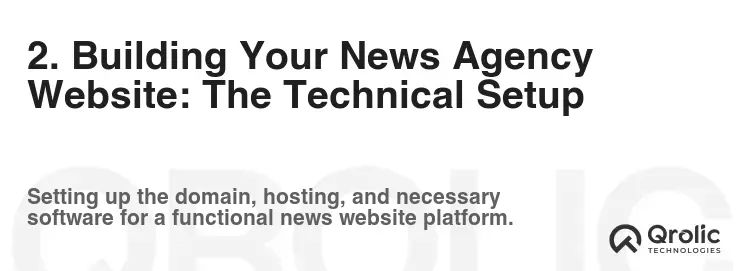
2.1 Choosing a Content Management System (CMS)
A CMS is the software that powers your website, allowing you to create, manage, and publish content without needing to code.
2.1.1 Popular CMS Options:
- WordPress: The most popular CMS in the world, known for its flexibility, ease of use, and extensive plugin ecosystem. Highly suitable for news agency websites due to its robust content management capabilities and SEO-friendliness.
- Drupal: A powerful and flexible CMS that is well-suited for complex websites with high security requirements. Often used by government agencies and large organizations.
- Joomla: A user-friendly CMS that offers a balance between flexibility and ease of use. Suitable for a variety of websites, including news agencies and online magazines.
- Ghost: A minimalist CMS designed specifically for blogging and online publishing. Ideal for news agencies that prioritize writing and content creation.
2.1.2 Key Factors to Consider When Choosing a CMS:
- Ease of Use: Choose a CMS that is easy to learn and use, even if you have limited technical skills.
- Flexibility: Ensure the CMS can be customized to meet your specific needs.
- Scalability: Choose a CMS that can handle your website’s growth and increasing traffic.
- Security: Look for a CMS with robust security features and regular updates.
- SEO-Friendliness: Choose a CMS that is optimized for search engines.
- Plugin Ecosystem: Consider the availability of plugins and extensions that can extend the CMS’s functionality.
- Community Support: Look for a CMS with a large and active community that can provide support and assistance.
Why WordPress is Often the Best Choice for News Agencies:
- Extensive Theme Library: WordPress offers a wide variety of themes specifically designed for news agencies and online magazines.
- Powerful Plugins: Plugins like Yoast SEO, Jetpack, and Akismet can enhance your website’s SEO, security, and performance.
- Easy Content Management: WordPress provides a user-friendly interface for creating, editing, and publishing content.
- Large Community: WordPress has a vast and active community of users and developers who can provide support and assistance.
Example: For a news agency seeking a flexible and SEO-friendly CMS with a wide range of themes and plugins, wordpress is an excellent choice.
2.2 Selecting a News-Specific Theme or Template (“Journalism Design”)
Your website’s theme or template determines its visual appearance and overall design. Choose a theme that is professional, visually appealing, and optimized for readability.
2.2.1 Key Features of a Good News Agency Theme:
- Clean and Modern Design: A clean and uncluttered design will help readers focus on your content.
- Responsive Design: Ensure the theme is responsive and adapts to different screen sizes and devices.
- Fast Loading Speed: Optimize the theme for fast loading speed to improve user experience and SEO.
- Customizable Layout: Choose a theme that allows you to customize the layout and design to match your brand.
- Multiple Content Layouts: Look for a theme that offers a variety of content layouts, such as grid layouts, list layouts, and featured article layouts.
- Category-Specific Design: The ability to customize the design based on category.
- Social Media Integration: Ensure the theme is integrated with social media platforms to make it easy for readers to share your content.
- Ad Management: Look for a theme that allows you to easily manage and display ads on your website.
- SEO Optimization: Choose a theme that is optimized for search engines.
2.2.2 Popular News Agency Themes:
- Newspaper: A popular premium theme for news agencies and online magazines.
- JNews: Another popular premium theme with a wide range of features and customization options.
- Soledad: A versatile theme that can be used for a variety of websites, including news agencies.
- MH Magazine: A free theme with a clean and modern design.
- ColorMag: A free theme with a magazine-style layout.
2.2.3 Custom Theme Development:
- If you have specific design requirements or want a unique look for your website, consider hiring a web designer to create a custom theme.
- Custom themes offer greater flexibility and control over your website’s design.
- However, custom themes can be more expensive and time-consuming to develop.
Example: A news agency might choose a premium theme like Newspaper or JNews for its extensive features and customization options. Alternatively, a smaller news agency might opt for a free theme like MH Magazine or ColorMag to save on costs.
2.3 Installing Essential Plugins
Plugins are add-ons that extend the functionality of your CMS. Install plugins that enhance your website’s SEO, security, performance, and user experience.
2.3.1 Must-Have Plugins for News Agency Websites:
- Yoast SEO: A comprehensive SEO plugin that helps you optimize your content for search engines.
- Jetpack: A suite of tools that provide security, performance, and marketing features.
- Akismet Anti-Spam: A plugin that protects your website from spam comments.
- WP Super Cache: A caching plugin that improves your website’s loading speed.
- Contact Form 7: A plugin that allows you to create custom contact forms.
- Social Warfare: A social media sharing plugin that makes it easy for readers to share your content.
- Google Analytics for WordPress by MonsterInsights: A plugin that integrates your website with Google Analytics.
- UpdraftPlus: A backup plugin that allows you to easily back up your website.
- Wordfence Security: A security plugin that protects your website from malware and hacking attempts.
- AMP for WP: A plugin that creates Accelerated Mobile Pages (AMP) for your website.
2.3.2 Plugin Considerations:
- Choose plugins from reputable developers with good reviews.
- Keep your plugins updated to ensure they are secure and compatible with your CMS.
- Avoid installing too many plugins, as this can slow down your website.
- Test plugins thoroughly before activating them on your live website.
Example: A news agency would likely install Yoast SEO to optimize its content for search engines, Jetpack for security and performance features, and Social Warfare to encourage readers to share its content on social media.
3. Populating Your News Agency Website: Content Creation and Management
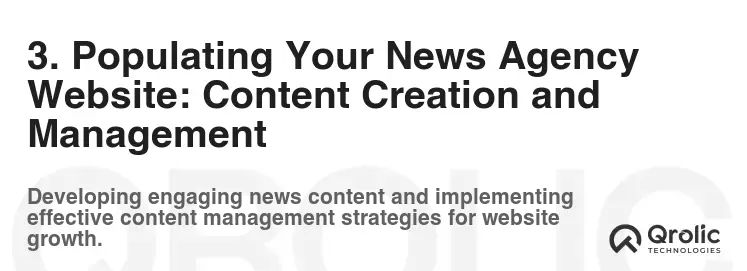
3.1 Creating Engaging and Informative Content
The quality of your content is the most important factor in attracting and retaining readers. Focus on creating engaging, informative, and well-written articles, videos, and podcasts.
3.1.1 Writing Compelling Headlines:
- Use strong verbs and keywords in your headlines.
- Keep your headlines concise and to the point.
- Make your headlines intriguing and attention-grabbing.
- Use numbers and lists in your headlines to increase click-through rates.
- Test different headlines to see which ones perform best.
3.1.2 Crafting High-Quality Articles:
- Research your topics thoroughly and cite your sources.
- Write in a clear, concise, and engaging style.
- Use headings, subheadings, and bullet points to break up your text.
- Include images, videos, and other multimedia elements to enhance your articles.
- Proofread your articles carefully before publishing them.
- Optimize your articles for search engines by using relevant keywords.
3.1.3 Producing High-Quality Videos and Podcasts:
- Invest in good quality equipment, such as a microphone and camera.
- Plan your videos and podcasts in advance.
- Edit your videos and podcasts carefully to remove any mistakes or distractions.
- Promote your videos and podcasts on social media and other channels.
Example: A news agency writing about a local election might conduct thorough research on the candidates and their platforms, write clear and concise articles that explain the key issues, and produce videos of candidate interviews and town hall meetings.
3.2 Optimizing Content for Search Engines (SEO)
SEO is the process of optimizing your website and content to rank higher in search engine results pages (SERPs).
3.2.1 Keyword Research:
- Identify relevant keywords that your target audience is searching for.
- Use keyword research tools like Google Keyword Planner, Ahrefs, and SEMrush.
- Focus on long-tail keywords, which are longer and more specific phrases.
3.2.2 On-Page Optimization:
- Optimize your headlines, meta descriptions, and image alt text with relevant keywords.
- Use keywords naturally throughout your content.
- Create high-quality, original content that provides value to your audience.
- Use internal and external links to improve your website’s authority.
- Ensure your website is mobile-friendly and loads quickly.
3.2.3 Off-Page Optimization:
- Build backlinks from other reputable websites.
- Promote your content on social media.
- Participate in online communities and forums.
- Get listed in online directories.
Example: A news agency writing about climate change might research keywords such as “climate change,” “global warming,” “renewable energy,” and “carbon emissions.” The agency would then use these keywords in its headlines, meta descriptions, and content. The agency would also build backlinks from other environmental organizations and promote its content on social media.
3.3 Managing and Organizing Content
A well-organized website is easier for readers to navigate and find the information they need.
3.3.1 Using Categories and Tags:
- Organize your content into categories and tags to make it easier for readers to find related articles.
- Use a consistent tagging system.
- Create category and tag pages that provide a brief overview of the topic.
3.3.2 Implementing a Content Calendar:
- Plan your content schedule in advance to ensure you are consistently publishing new content.
- Use a content calendar to track your progress and stay organized.
- Consider seasonal events, holidays, and industry trends when planning your content.
3.3.3 Using a Content Management System (CMS):
- A CMS like WordPress makes it easy to manage and organize your content.
- Use the CMS to create, edit, and publish articles, videos, and podcasts.
- Use the CMS to manage your website’s design and layout.
Example: A news agency might use categories such as “Politics,” “Business,” “Sports,” and “Entertainment” to organize its content. The agency might also use tags such as “Election,” “Economy,” “Football,” and “Movies” to further refine its content organization.
4. Promoting Your News Agency Website: Reaching Your Audience
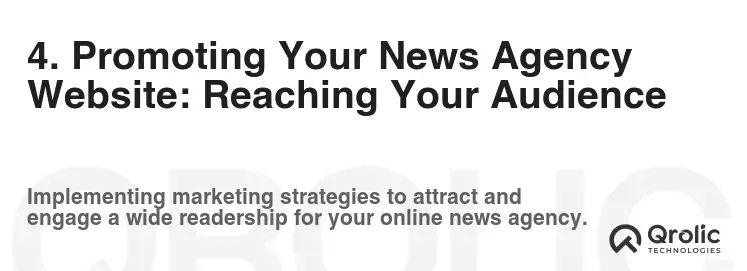
4.1 Social Media Marketing
Social media is a powerful tool for promoting your news agency and reaching a wider audience.
4.1.1 Choosing the Right Platforms:
- Identify the social media platforms that your target audience uses most frequently.
- Focus your efforts on a few key platforms rather than trying to be everywhere.
- Consider platforms such as Facebook, Twitter, LinkedIn, Instagram, and YouTube.
4.1.2 Creating Engaging Social Media Content:
- Share your articles, videos, and podcasts on social media.
- Write compelling social media posts that encourage readers to click through to your website.
- Use relevant hashtags to reach a wider audience.
- Engage with your followers by responding to comments and questions.
- Run contests and giveaways to attract new followers.
4.1.3 Social Media Advertising:
- Use social media advertising to target specific demographics and interests.
- Create targeted ad campaigns to promote your content and attract new readers.
- Track your ad performance to see which campaigns are most effective.
Example: A news agency might use Facebook to share its articles and videos, Twitter to provide breaking news updates, LinkedIn to target business professionals, and Instagram to share visually appealing images and videos.
4.2 Email Marketing
Email marketing is a direct way to reach your audience and keep them informed about your latest content.
4.2.1 Building an Email List:
- Offer a free newsletter or e-book in exchange for email addresses.
- Promote your email list on your website and social media channels.
- Use a pop-up form to capture email addresses from website visitors.
4.2.2 Creating Engaging Email Newsletters:
- Send regular email newsletters to your subscribers.
- Include your latest articles, videos, and podcasts in your newsletters.
- Write compelling subject lines that encourage readers to open your emails.
- Personalize your emails by using your subscribers’ names.
- Track your email open rates and click-through rates to see what content resonates with your audience.
4.2.3 Email Automation:
- Use email automation tools to send automated emails to new subscribers.
- Create automated email sequences to nurture leads and promote your content.
Example: A news agency might offer a daily newsletter that summarizes the top news stories of the day. The agency would promote its newsletter on its website and social media channels and use a pop-up form to capture email addresses from website visitors.
4.3 Public Relations and Media Outreach
Building relationships with other journalists and media outlets can help you promote your news agency and increase its visibility.
4.3.1 Identifying Key Journalists and Media Outlets:
- Research journalists and media outlets that cover topics related to your niche.
- Identify journalists who are influential and have a large following.
4.3.2 Building Relationships:
- Follow journalists and media outlets on social media.
- Share their content and engage with them online.
- Attend industry events and conferences to meet journalists in person.
- Offer journalists exclusive access to your content.
4.3.3 Issuing Press Releases:
- Write press releases to announce newsworthy events or developments.
- Distribute your press releases to relevant journalists and media outlets.
Example: A news agency covering local politics might build relationships with local journalists and media outlets. The agency would share their content, attend local events, and offer them exclusive access to its reporting.
5. Monetizing Your News Agency Website: Generating Revenue
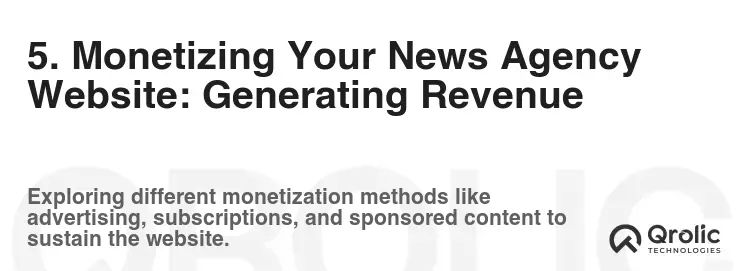
5.1 Advertising
Advertising is a common way to generate revenue from a news agency website.
5.1.1 Display Advertising:
- Display ads on your website using ad networks like Google AdSense.
- Sell ad space directly to advertisers.
- Use ad management tools to optimize your ad placements and revenue.
5.1.2 Native Advertising:
- Create sponsored content that blends in with your editorial content.
- Clearly label native advertising as sponsored content.
5.1.3 Affiliate Marketing:
- Promote products or services on your website and earn a commission on sales.
- Choose products or services that are relevant to your audience.
Example: A news agency might display Google AdSense ads on its website, sell ad space directly to local businesses, and promote affiliate products related to its niche.
5.2 Subscriptions
Offering subscriptions allows you to generate recurring revenue from your most loyal readers.
5.2.1 Creating Subscription Tiers:
- Offer different subscription tiers with varying levels of access and benefits.
- Consider offering a free trial to attract new subscribers.
5.2.2 Offering Premium Content:
- Provide exclusive content to subscribers, such as in-depth analysis, investigative reports, and behind-the-scenes coverage.
- Create a members-only forum or community.
5.2.3 Payment Processing:
- Use a payment processing platform like Stripe or PayPal to collect subscription payments.
Example: A news agency might offer a basic subscription that provides access to all of its articles, a premium subscription that includes exclusive content and access to a members-only forum, and a VIP subscription that includes personalized access to its journalists.
5.3 Donations
Accepting donations from your readers is a way to generate revenue while maintaining your editorial independence.
5.3.1 Setting Up a Donation Page:
- Create a donation page on your website that explains why you are asking for donations.
- Make it easy for readers to donate by using a simple and secure donation form.
5.3.2 Promoting Donations:
- Promote your donation page on your website and social media channels.
- Explain how donations will be used to support your journalism.
5.3.3 Transparency:
- Be transparent about how you are using donations.
- Provide regular updates to your donors.
Example: A non-profit news agency might rely on donations from its readers to fund its investigative reporting. The agency would create a donation page that explains its mission and how donations will be used to support its journalism.
6. Qrolic Technologies: Your Partner in Digital Success
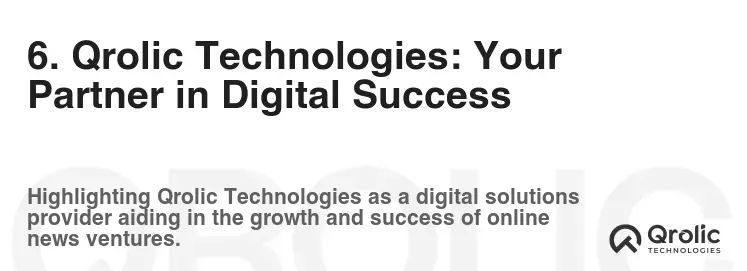
Qrolic Technologies (https://qrolic.com/) understands the unique challenges and opportunities facing news agencies in the digital age. We offer a comprehensive suite of services designed to help you build, grow, and monetize your online presence.
6.1 Website Development and Design:
- We specialize in creating custom websites for news agencies using the latest technologies and best practices.
- Our team of experienced designers and developers can create a website that is visually appealing, user-friendly, and optimized for search engines.
- We offer a range of design options, from pre-built templates to fully customized solutions.
6.2 SEO and Digital Marketing:
- We help news agencies improve their search engine rankings and attract more organic traffic.
- Our SEO experts conduct keyword research, optimize content, and build backlinks to improve your website’s authority.
- We also offer social media marketing, email marketing, and other digital marketing services to help you reach a wider audience.
6.3 Content Strategy and Creation:
- We help news agencies develop a content strategy that aligns with their goals and target audience.
- Our team of writers and editors can create high-quality articles, videos, and podcasts that engage and inform your readers.
- We also offer content optimization services to ensure your content is optimized for search engines.
6.4 Website Maintenance and Support:
- We provide ongoing website maintenance and support to ensure your website is secure, up-to-date, and performing at its best.
- Our team of technical experts is available to provide assistance with any issues or questions you may have.
6.5 Why Choose Qrolic Technologies?
- Experience: We have extensive experience working with news agencies and understand their unique needs.
- Expertise: Our team of experts is highly skilled in website development, SEO, digital marketing, and content creation.
- Results-Oriented: We are committed to delivering results and helping our clients achieve their goals.
- Customer-Focused: We provide excellent customer service and are always available to answer your questions.
- Affordable Pricing: We offer competitive pricing and flexible payment options.
Partner with Qrolic Technologies and take your news agency website to the next level! Visit https://qrolic.com/ to learn more.
7. Measuring Success: Analytics and Reporting
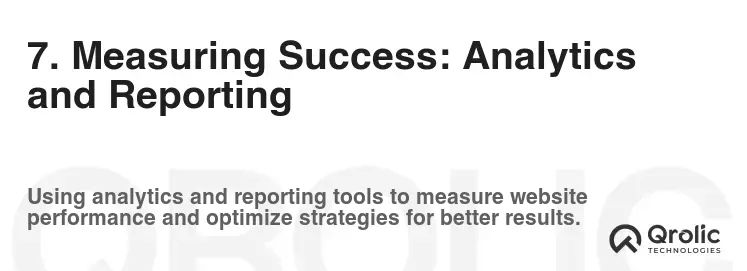
7.1 Setting Up Google Analytics
Google Analytics is a free tool that allows you to track your website’s traffic, user behavior, and performance.
7.1.1 Creating a Google Analytics Account:
- Go to the Google Analytics website and create an account.
- Add your website to your Google Analytics account.
- Install the Google Analytics tracking code on your website.
7.1.2 Tracking Key Metrics:
- Track key metrics such as website traffic, bounce rate, time on site, and conversion rate.
- Use Google Analytics to identify your most popular content and traffic sources.
- Monitor your website’s performance over time.
7.2 Creating Custom Reports
Google Analytics allows you to create custom reports that track specific metrics and segments of your audience.
7.2.1 Defining Your Goals:
- Define your goals for your website, such as increasing traffic, generating leads, or driving sales.
- Create custom reports that track your progress towards your goals.
7.2.2 Segmenting Your Audience:
- Segment your audience by demographics, interests, and behavior.
- Create custom reports that track the performance of different segments of your audience.
7.3 Using Data to Improve Your Website
The data you collect from Google Analytics can be used to improve your website’s design, content, and marketing efforts.
7.3.1 Identifying Areas for Improvement:
- Use Google Analytics to identify areas where your website is underperforming.
- Look for pages with high bounce rates or low time on site.
- Identify traffic sources that are not converting well.
7.3.2 Making Data-Driven Decisions:
- Use data to make informed decisions about your website’s design, content, and marketing efforts.
- Test different changes and track the results in Google Analytics.
- Continuously improve your website based on data and feedback.
By following this step-by-step guide, you can create a successful news agency website that informs, engages, and monetizes your audience. Remember to focus on creating high-quality content, optimizing your website for search engines, and promoting your website through social media, email marketing, and public relations. And don’t hesitate to partner with Qrolic Technologies to take your digital presence to the next level.
